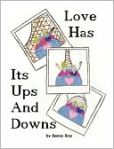Originally published September 23, 2012
Love Has Its Ups and Downs, by Bonnie Rice, available for $9.00 (and on Smashwords).
This was one of those times when a post on my blog generated a request for a “look see” at another author’s book dealing with the twists and turns of our phenomenal human brains. Well, I’m glad I followed through. Bonnie has written a great little book.
A bit of background; somewhere in the mid 1980s, shortly after several rather crushing crises in my life, I happened to be attending a Soroptimist luncheon. The guest speaker was a woman who had bi-polar disorder. Like many typical cases (if there is such a thing with this disorder) her life was just fine until she went off to college: then the cosmos collapsed. In that day there wasn’t much known about the bi-polar condition and it was consistently misdiagnosed. In the end her parents agreed to shock therapy. Something I categorize with lobotomies and leeches. This lady had come to terms with what had happened to her and although there was a block of her life that was simply wiped from her memory; she had gained control of her condition. I was impressed and spoke with her after the luncheon. She recommended that I read Masks of Melancholy by John White. Thus, the dawn broke on the horizon of my own life.
What I learned was something about the symptoms and manifestations of bi-polar disorder, I instantly recognized many of the issues in my own family, most specifically in my father and in myself. I also understood why, all those years ago, anti-depressants had nearly destroyed me. To this day I avoid anything that even has the possibility of a side effect involving depression. Anti-depressants probably also contributed greatly to my father’s difficulties. He was not actually diagnosed until many years later when another manifestation of the disorder, kleptomania, reared its ugly head. The speaker at that luncheon gave me tools and I proceeded to hone them and use them. Bonnie’s book would have been a great help then and through the years leading up to that realization. Suddenly, I realized why only one doctor had ever made any difference in my emotional state: he had used lithium. So, here are the things that most touched me about Bonnie’s book.
Boundaries. This chapter is so critical and not only to those dealing with bi-polar problems. It applies to any mental disorder or personality issue. I think that if I had learned boundaries earlier in my life I would have had fewer issues with people using my propensity to depression as leverage. It is a beautiful chapter well presented and easy to follow. Good habits start small. Set small boundaries first. By the way, “God grant me the Serenity” is hanging on the wall over my desk and has been somewhere in my house for years.
Drugs. Bonnie is not a doctor, but she has spent hours learning about the relevant drugs and their interactions. Some of the issues she presents are fundamental reasons that people who are bi-polar do not like to take drugs. First of all, it’s hard to give up the highs, at least some of them. Second, life is hard enough without suddenly taking off on magic carpet rides because of some magic mix exploding in your brain. Anyone dealing with bi-polar disorders should read through this part carefully. Use it to do your own research and talk with the doctors involved. Let me reinforce something that Bonnie brings up: never, never, never allow doctors to treat a bi-polar condition with only anti-depressants. Unless, of course, you want the person to wander off and commit suicide and solve your problem completely; keep in mind it tends to trigger manic episodes and it may not be the manic that gets hurt. If persistent depression is an issue that drives someone to a doctor, there are now written tests that can profile a patient for possible bi-polar disorders. They obviously have to be taken at different times. Look for the other symptoms (Bonnie does a good job of describing some of the core issues). There are no quick fixes; neither can you rely on a specific treatment for ever once established. Nothing affecting our brains is simple. If there appears to be a problem, get educated.
Personally, I think Bonnie’s little book is a terrific addition to the literature on the subject. It provides an upbeat and informative mini-course on balancing life with mental disorders without surrendering your soul.




No Comments